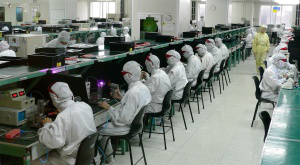Sunday Reflection with Fr Terry Tastard - 6 February 2011

Shenzhen electronics factory - pic: Wikipedia
Salt is a marvellous ingredient, when judiciously used. It seems to bring out the best in all the other flavours. We have all had the experience of tasting a stew or a soup without salt and finding it bland. A touch of salt and hey presto! Everything else in the mix can be tasted as well. So when Jesus uses the image of salt to describe Christians, it could be seen as an enabling role.
It links, in fact, to another of Jesus's culinary images, the table of the feast in the great kingdom. All are invited to that table. As enablers, it is the role of Christian men and women to try and make the company at that table as inclusive as possible. The able-bodied and the disabled; the poor and the rich; the respectable and those regarded as disreputable; everybody is invited by the Lord. They are invited not only to receive but to contribute also, so that in the company of the Kingdom there are many talents and skills, each working for the good of all. Salt, you might say, in action, helping to create a true community.
What are the hallmarks of this kingdom? Jesus, with his theme of light, echoes the third section of Isaiah, written approximately 500 BC (Isa. 58.7-10). To feed the hungry, shelter the homeless, clothe the naked, to recognise our common humanity - these are marks of a truly caring person. Interestingly, it is also seen as bringing healing to the helpers too. We know this only too well, that when we are wrapped up in ourselves, our misery only increases, but when we can forget ourselves enough to help others, often we feel better too.
Still, reading Isaiah, with his demands for justice, I wonder sometimes how radical and how aware we need to be in our complex, global world. Few Christians would feel comfortable putting a yoke on the shoulders of others, as if they were oxen; we would want to banish the clenched fist and the harsh word. But we live in a world where the markets intertwine more and more. We have an endless thirst for consumer goods produced cheaply and en masse. I think of the Apple goods produced at the vast Shenzhen factory in China, where reportedly there were ten suicides last year among the workers, who live on site, with shifts keeping the factory going 24/7.
Capitalism has brought enormous rises in living standards in the Third World. I recognise that it has been an engine for change which has dramatically improved the lives of poor people. I gather that the factory has improved conditions in response to criticism. But I wonder where it will end.
Are there limits to growth? Can we consume more and more? And what is the cost, humanly speaking? Do our consumer goods depend on working conditions that we would never tolerate ourselves?
Fr Terry is Parish Priest at Holy Trinity Catholic Church in Brook Green, west London. His latest book: Ronald Knox and English Catholicism is published by Gracewing at £12.99 and is available on Amazon, on ICN's front page. To read Sr Gemma Simmonds' review on ICN see: www.indcatholicnews.com/news.php?viewStory=16114


















